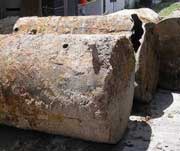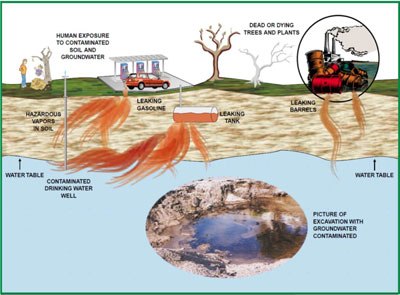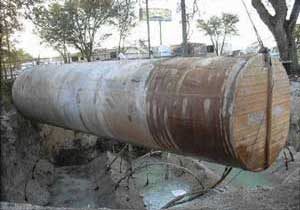With the state continuing to face difficult economic times, legislators must decide on even more budget reductions. Environmental protection is usually an easy target for budget cuts, especially underground petroleum storage tanks (USTs) because they are out of sight.
“People don’t think much about this, but there are tanks with 10,000 gallons of fuel underneath the ground near our groundwater. Who is watching them?” asks Jeffrey Halsey, president of Florida Local Environmental Resource Agencies (FLERA).

Since the late 1980s, local programs have been inspecting USTs annually under contracts with the state but those funds have been targeted for reductions. “We want to emphasize to the state not to cut this very important program that helps to keep our water clean,” he added.
Prior to 2011, about $10 million from the Inland Protection Trust Fund was spent to inspect USTs annually. Last year, funding was cut to $7 million and inspections reduced to every other year. For 2013, only $5.9 million has been proposed for UST inspections.
Releases from USTs caused by spills, overfills or leaking tanks and piping can cause fires or explosions that threaten human safety, or contaminate groundwater. Human exposure can occur through ingestion of contaminated drinking water, inhalation of vapors, and contact with the skin. Benzene and other chemicals found in petroleum products have been shown to cause cancer.
Regulation of USTs began in the early 1980s because Florida’s groundwater was at risk of contamination. Even today, the U.S. Environmental Protection Agency (EPA) estimates that Florida has more sites contaminated with petroleum than any other state in the nation. In Florida, there are over 15,450 contaminated sites, including over 2,800 in the Tampa Bay region.
The Inland Protection Trust Fund was created in 1986 to pay for the cleanup of petroleum contaminated sites and prevent future spills. Today, drivers are charged about four cents a gallon – for a total of about $133 million a year – to clean up contaminated sites and prevent leaks.
Last year, $8 million of the funds collected for tank inspections and cleanup programs was taken by the Legislature to help balance the state’s budget. “Based on the amount of the fund, the Legislature can decide how to allocate the funds,” said FDEP Bureau Chief Robert Brown.

“At FLERA, our legislative policy is that the money that is collected at the gas pump for inspection and cleanup should not be used for any other purpose,” said Rick Tschantz, past president of FLERA and director of legal and administration at the Environmental Protection Commission of Hillsborough County (EPCHC).
While legislation in the early 1990s required gas stations to install double-walled tanks to reduce leaks, 10 of 19 discharges reported in Hillsborough County last year were from double-walled systems, according to EPCHC. That’s because double walls don’t address other system components that account for a large portion of discharges.
“A number of the leaks come from the spill buckets, the piping sumps or liners. That’s all part of the compliance inspection and why it’s important to do inspections annually,” said Andy Schipfer, manager of petroleum cleanup at EPCHC. “We’ve seen them [spill buckets] break and crack within a couple of years,” adds Monica Sylvain, the agency’s compliance manager.
Spills can also occur when the delivery truck hose is disconnected. Although these spills are small, repeated small releases can cause big environmental problems. “When you go to a gas station and see a tanker truck filling up the tanks, there’s a bucket that captures anything that spills over. But if the bucket is cracked, it doesn’t do the capturing and spills into the ground contaminating the soil and groundwater below,” said Schipfer.
“One of the things we look at during inspections is the spill containment buckets because they tend to deteriorate easily. That’s a very important part of our inspection. It is through the vigilance of the yearly inspections that many spill bucket problems are detected,” he added.
“Even if it’s not seeping all the way into the groundwater, by the time they come along and check the tanks, it’s more difficult to clean up the petroleum that gets into the soil. That makes it more expensive and difficult,” said State Rep. Michelle Rehwinkel Vasilinda, (D- Leon Co.) a member of the Agriculture and Natural Resources Appropriations Committee that will recommend the budget for inspections.
Preventing just one release could save $400,000 — the average cost to clean up a contaminated site. “Not having inspections done often is being ‘penny wise and pound foolish.’ I think the most cost-effective thing to do is to have the tanks inspected once a year,” she added.
The storage tanks inspection program in Hillsborough County has been administered by the EPCHC under contract from the FDEP since 1988. Hooshang Boostani, director of waste management at EPCHC explains that there are two contracts: a yearly inspection contract to ensure that the tanks are operating properly and a contract to oversee contamination cleanup. Before a tank is installed or removed, EPC staff review the plan to certify all state regulations are met. Inspections are performed during all phases of construction to verify the installation or removal was performed correctly.
“It is more efficient to oversee cleanups locally,” notes Hillsborough County Commissioner Kevin Beckner who also serves as chair of the EPCHC. “Economically, it makes sense to keep the monies spent locally where the environmental impacts are occurring as well. We are local, we are knowledgeable on local conditions, and we can be more efficient based on proximity to the issues.”

The FDEP proposed a budget of $125 million for fiscal year 2013, which starts July 1, 2013, for the cleanup of spills that the department has prioritized based on proximity to drinking wells. Additionally, $5.9 million is proposed for local programs to inspect the 20,000 USTs across the state.
Prior to 2011, the Legislature granted FDEP $10 million for compliance inspections. In 2011, the legislature reduced the funding to $7 million, a 30% reduction. The budget submitted for the storage tank inspection contracts for 2012 proposed to cut the budget further to $4.5 million, an additional 36% reduction.
FLERA representatives talked to Legislators last year to explain the need for maintaining the funding at $7 million. The Legislature ultimately agreed and left the funding in place, but only $5.9 million has been distributed to local programs, according to the FDEP. The remaining $1.1 million may be redistributed to local programs after the first half of the fiscal year if the FDEP determines that the additional funds are needed.
The FDEP also had proposed to eliminate the role of the local governments by hiring private contractors and state staff. “We pointed out this had not worked in the past,” added Tschantz. “The FDEP dropped the idea, and instead merged the larger counties into the smaller counties.”
The Hillsborough team now oversees Manatee County’s program and Pinellas County checks Pasco County’s USTs – but with fewer staff. “We used to do about 1500 inspections with nine inspectors, but we are now doing 800 inspections with four inspectors and we sometimes have to do reinspections,” said Boostani.

As part of the 2012 budget cuts, when FDEP reduced tank inspections from once a year to every other year, there was even talk of going to every three years, according to Tschantz. Although the EPA’s Energy Policy Act of 2005 requires that USTs cannot go more than three years without being inspected, Florida has been inspecting USTs yearly since the program started. “When you reduce oversight and compliance inspections, you increase risk. Anytime you increase risk, we are concerned,” said Boostani.
As the Legislature considers its options this March, officials urge residents to contact their local legislative delegation to raise awareness of the importance of underground storage tank inspection funding. “The more citizens are involved, the better job we do because we know someone is watching and interested,” said Rep. Rehwinkel Vasilinda.
“We want decision makers to understand the value that all the local programs bring to the table and understand the impacts if they are cut,” adds FLERA President Halsey. “From a statewide perspective, this is one of the most important issues facing local environmental agencies.”
[su_divider] Originally published Winter 2013